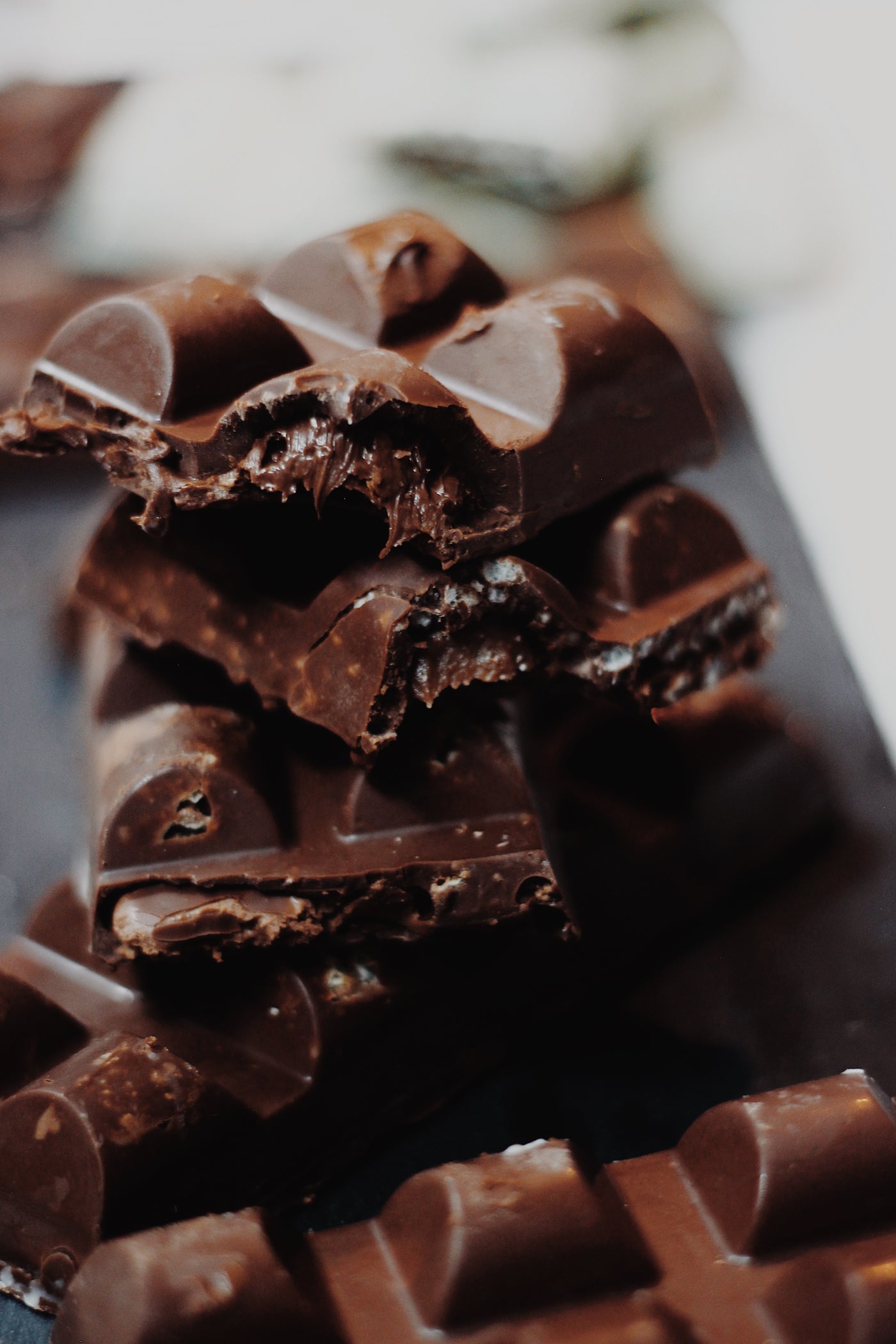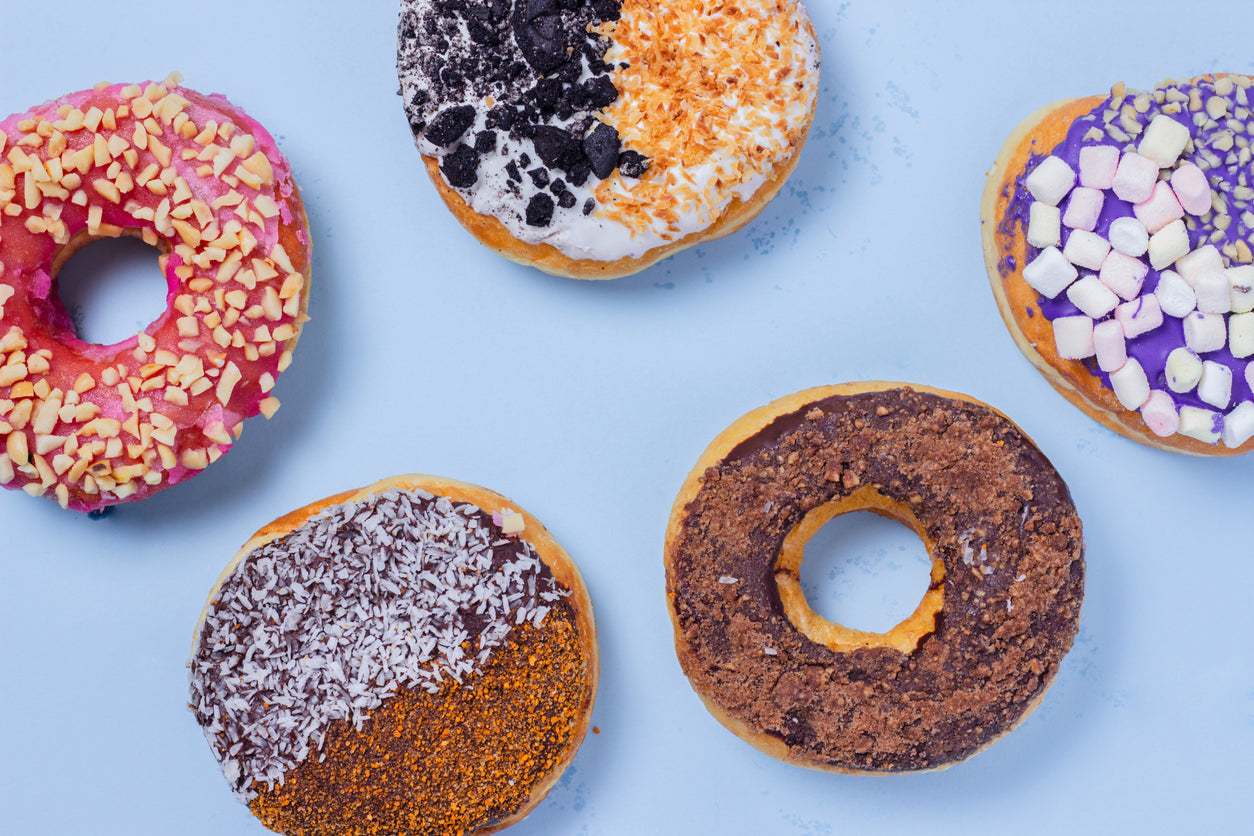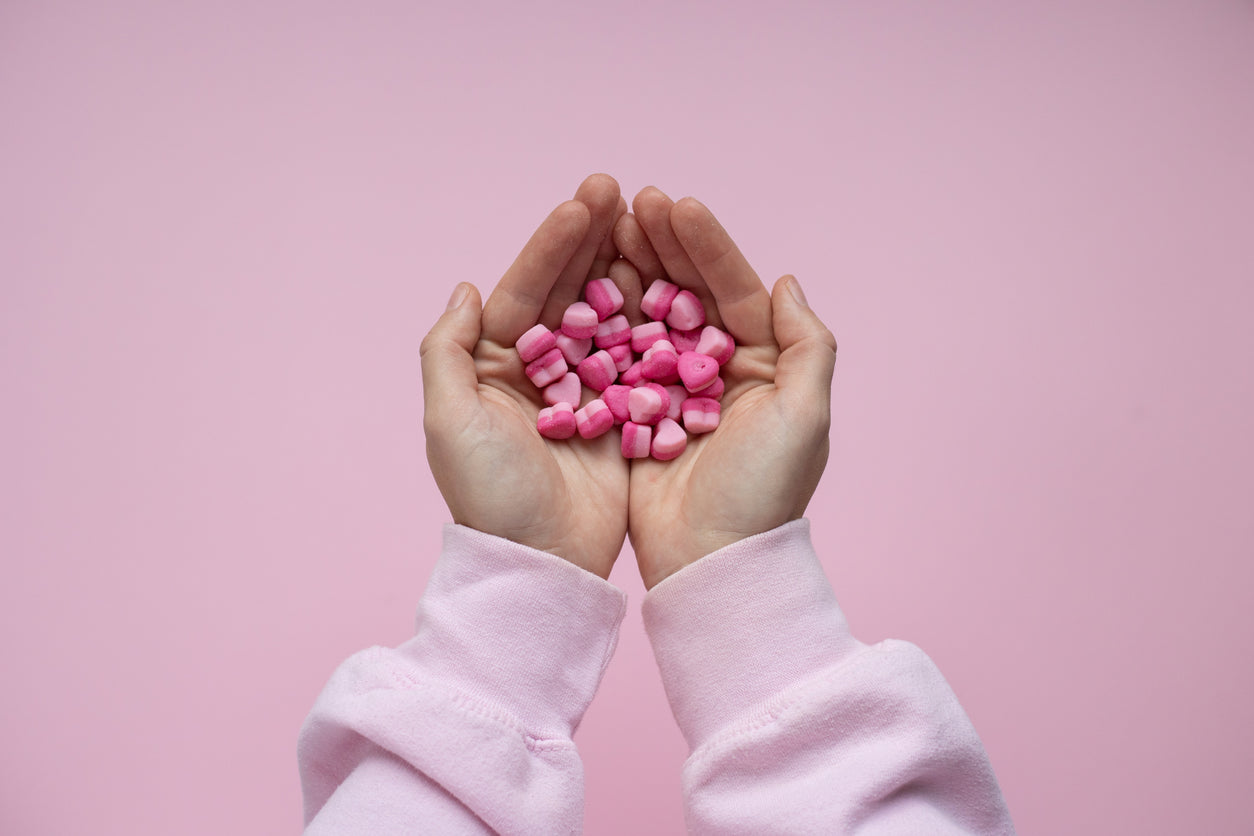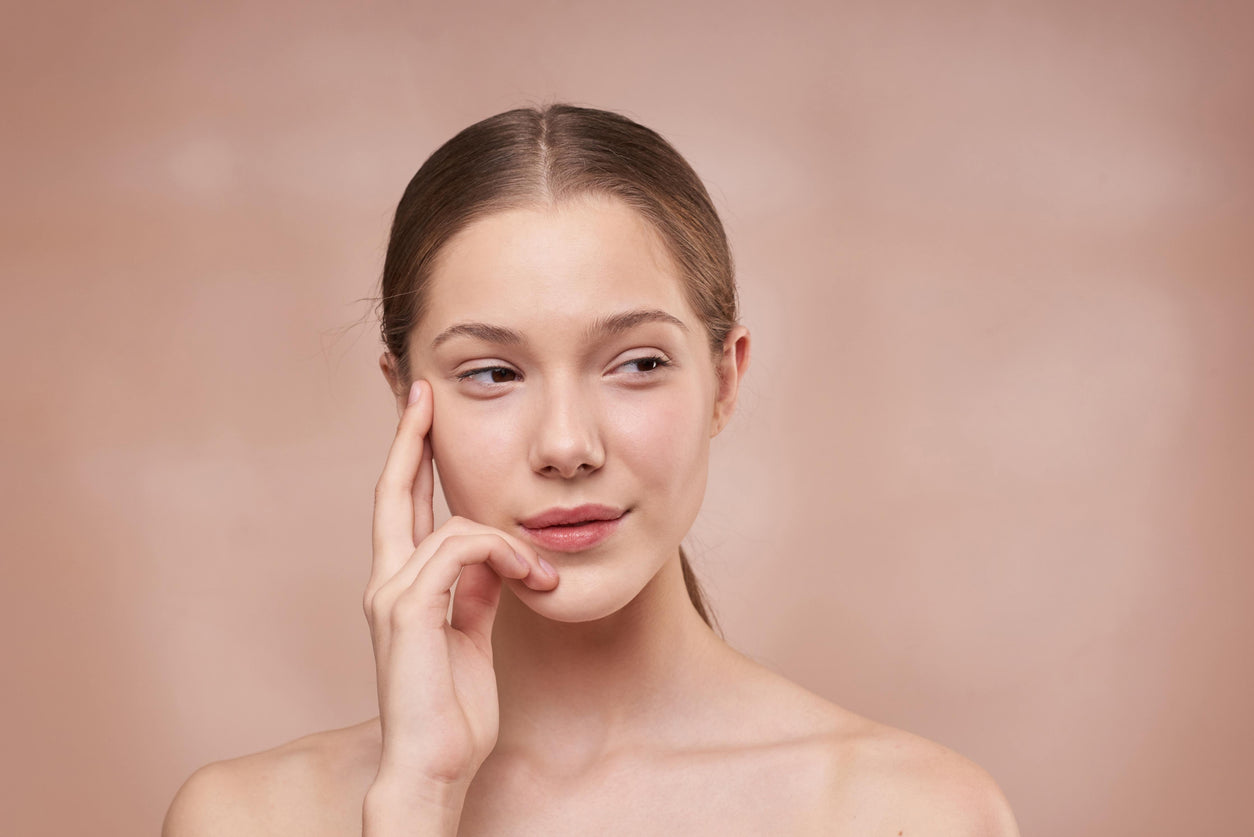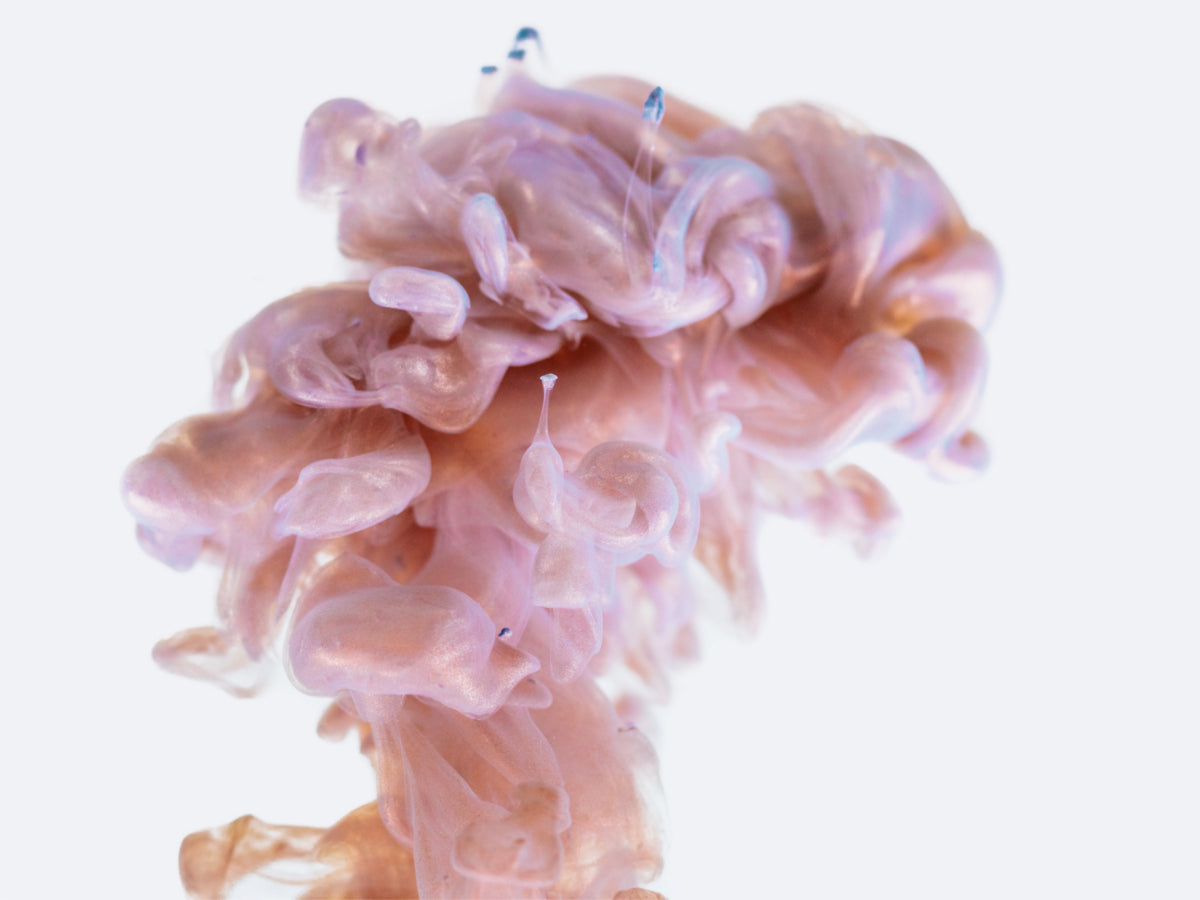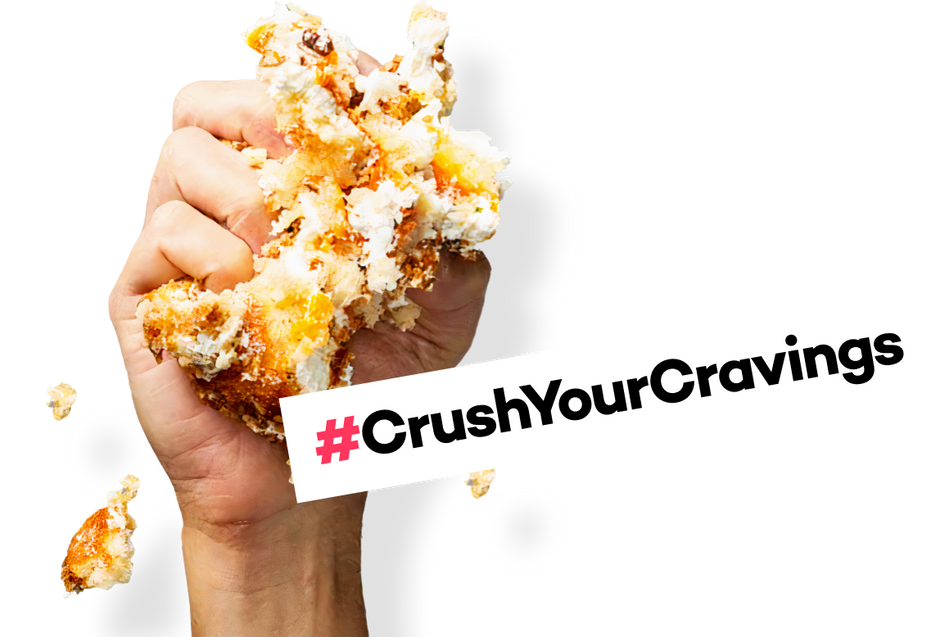Coming to the realisation that you simply can’t stop eating chocolate and may have to admit you have a chocolate addiction is frustrating, to say the least.
You curse your sweet tooth, lack of self-discipline and willpower, research how to prevent chocolate cravings in a half-hearted attempt to win back some self-control, and then, guess what? You reach for more chocolate.
For many of us on a journey to cut down on sugar, chocolate is the biggest challenge. The tastiest obstacle. Today it’s time to break that chocolate addiction so you can indulge from time to time, guilt-free and on your own terms.
Is Chocolate Actually Addictive?
Do you often find yourself saying, “just another chocolate button won’t hurt…” before realising you’ve devoured the entire share bag? That could (but not always) be a sign of chocolate addiction.
You eat chocolate when you’re happy and when you’re sad. You eat chocolate as a celebration and as a consolation prize. You eat it when you’re stressed, when you’re bored, when you’re distracted and when it’s simply the only thing within reach when you open the fridge (yes, chocolate does belong in the fridge).
You genuinely believe everything would taste better with it.
You see a pattern, don’t you? For those of us addicted to chocolate, it seems like the cure for everything.
Addiction can sound like a huge deal - and it is, but it’s worth understanding it in this context. Chocolate creates addiction-like cravings. It’s mainly the sugar that causes this - when we eat it, our brain releases dopamine (the brain’s pleasure chemical). It’s a part of our in-built reward system that kept us from starving back in the day. We break this down further in our sugar cravings guide.
Chocolate (well, sugar) quite literally makes you feel good on a chemical level - similar to addictive drugs. Studies have shown that fructose, which is found in many popular products, even increases feelings of hunger, regardless of how full you are.
Habits have a large part to play here too. The more you eat it on a regular basis, the more it becomes a habit. You may have even been reinforcing this habit for decades.
What’s Wrong with Eating Chocolate?
A whole-food diet is by far the best option for eliminating added sugars. Avoiding hidden sugars in processed and packaged foods is far more hassle than it’s worth. By sticking to whole foods, you’ll feel confident you’re on track.
Nothing, but only when in moderation. Nothing is inherently bad or wrong. But as we mentioned above, it’s incredibly hard to achieve moderation when your body is creating these addiction-like cravings. Then the more you eat, the more your brain seeks it out. This happens for all kinds of sugary foods.
Eating a large amount of chocolate isn’t sustainable in the long term and not just because the excess calories will likely cause you to put on weight. Eating sugar regularly causes a quick burst in your energy levels, followed by the inevitable mid-afternoon sugar crash, making fatigue and lethargy an everyday part of your life.
The high sugar content can also cause premature ageing and poor skin, fluctuations in mood, and, in the long term, an increased risk of diabetes and heart disease.
Why Do Chocolate Cravings Happen?
There are many completely natural reasons you may be having chocolate cravings (other than having a sugar or chocolate addiction or actually being hungry). Once you understand why you’re having these cravings, it can be a lot easier to figure out how to cut down, especially if you’re planning a natural sugar detox.
You're tired
You’ve probably already noticed that you eat more sugar when you’re tired. This is because the more sugar in your diet, the lower your quality of sleep. The real problem, however, is that when you get less sleep, it alters your appetite-regulating hormones, bringing on more cravings. You’re tired, and you’re extra hungry. No wonder, we simply find ourselves chasing that sugar high.
Your average chocolate bar does actually contain low levels of caffeine, but not enough to make a real difference like, say, coffee. The more processed the chocolate, the lower the amount of caffeine. Dark chocolate (with a higher cacao content), however, tends to have more caffeine - so it’s a better option overall.
You're stressed
When you’re feeling stressed, anxious or depressed, is chocolate your comfort food of choice? It’s pretty common that it is, after all, our body knows it will feel better from the resulting dopamine that comes from eating foods with sugar. It wants nothing more than to feel good, and so do you.
When your body is stressed, it produces cortisol, which provides glucose to the body. Having elevated cortisol over the long term consistently produces glucose, leading to increased blood sugar levels and even more cravings. It also restricts the production of the hormone leptin, which is designed to tell you when you’re full. Without it, you’ll likely end up bingeing.
Stress, unfortunately, is often unavoidable, but we can find ways to manage it. Actively incorporating stress management techniques into your day-to-day can make a real difference across many areas of life.
Your body is lacking certain nutrients
Generally speaking, food cravings can be a sign of nutrient deficiencies. But what is your body lacking when craving chocolate? Well, chocolate cravings, in particular, could be a sign that you have a magnesium deficiency. Research shows chocolate is high in magnesium.
As a result, incorporating magnesium supplements into your diet could help combat chocolate cravings and is known to alleviate anxiety too.
It's your time of the month
It’s no secret that when that time of the month rolls around, the chocolate cravings intensify and it can feel like the only thing on the planet that will make you feel better. There is a debate, however, about whether this is hormones or habit.
Obviously, during a period, your hormone levels are changing - oestrogen, progesterone and serotonin levels drop, while cortisol rises. As we know, rising cortisol leads us to seek out dopamine - as would a lack of serotonin (another happiness hormone).
Studies across different countries, however, have found that not all cultures experience chocolate cravings during their period. Interesting, right? Think about all the TV shows, films and social media where we see women battling the beast away with chocolate. Is this actually a habit that has been ingrained through media?
You're bored
Do you ever find yourself mindlessly eating chocolate at your desk, grazing all throughout the day? You’re probably bored. This is back to dopamine. If you’re bored or understimulated with what you’re doing, your brain will seek out that sweet dopamine release - and chocolate is where it’s at.
Eventually the act of reaching into your drawer, or walking over to the kitchen to get a piece (or bar) of chocolate becomes a habit, becoming just a normal part of your day. It gives you something to do other than what you’re actually meant to be doing - a procrastinator's best friend.
If this sounds like you, the best thing you can do is move the chocolate and snacks away from where you spend most of your time. Make it inaccessible, or at the very least, not within arms’ reach.
How to Stop Craving Chocolate
With so many reasons for sugar cravings to happen, it’s no surprise that there’s no magic pill that will eliminate addiction. Good stress management is a good start, but what about diet, exercise and hydration? Here we break down the ways that have been proven to work for those wanting to cut chocolate or sugar in general.
Log your chocolate habits
When you’re breaking a habit like sugar bingeing, tracking your progress can help you persevere in the long term. To know how much progress you’ve made, you need to know where you started. That’s where a chocolate log comes in. For a week, record every time you eat chocolate including when, what, why, how it made you feel and how you were feeling when you reached for it.
After the week, go back and review what you’ve written. You may start to see patterns in your behaviours, like overeating when you’re feeling sad - or even feeling happy and celebrating. From here, you can create a list of triggers to either avoid or deal with properly (perhaps with professional help).
Create an action plan
Goals that have action plans are far more likely to succeed than those that don’t. Willpower alone is very unlikely to get you to where you want to go, especially when it comes to habit change. You need to create a plan.
Using the suggestions below, start planning out how you’re going to tackle your goal - whether that’s giving up sugar entirely or just cutting down. Try preparing “if I feel x, then…” lists. For example: if I feel sugar cravings, I’ll take a sniff of my Killa Vanilla, if I’m feeling stressed and restless, I’ll go for a walk etc.
The quote goes: ‘if you fail to plan, you plan to fail’. Habit change requires preparation. One place to start is your surrounding environment. Remove temptations around you, make snacks inaccessible and set boundaries for yourself.
You may also want to incorporate non-food forms of reward, or set an allowance for how much chocolate you’ll allow yourself each week. It’s all about finding the plan that works for you.
Avoid skipping meals
Skipping meals, either by habit or as an intentional way to lose weight, will send your sugar cravings completely out of control. When your sugar cravings are that high, it makes it nearly impossible to say no to a chocolate bar. Instead, it’s recommended that you eat every 3 to 4 hours to maintain a stable metabolism. If you struggle to stay on track, it may be worth meal prepping.
Stay hydrated
Feel like you desperately need your chocolate fix? Drink a big glass of water.
Often when you think you’re hungry or craving something sweet, you’re actually thirsty. The body easily confuses thirst with sugar cravings. This is because glucose can’t be released without sufficient water. By drinking a glass of water, you allow your liver to start releasing the stored glucose again, balancing your sugar levels - it's a quick fix.
Dehydration can cause you to feel tired, give you headaches, and can either increase or lower your blood pressure (depending on other factors) and elevate your heart rate. And what do we do when we’re feeling bad? Eat that chocolate bar. Staying hydrated is simple but highly effective. You can monitor your water intake with time-tracking water bottles or habit trackers.
Eat protein-rich foods and plenty of fibre
Your goal should be to eat well-balanced, fulfilling meals - the kind that leaves you feeling fuller for longer. Both fibre and protein can help regulate your appetite and help you avoid binges or unwanted snacking.
Lean protein can provide you with longer-lasting energy, so it’s good practice to try to include a source of protein in each of your meals: breakfast, lunch and dinner. For breakfast, that might look like eggs on wholegrain toast or berries and nuts with Greek yoghurt. Dinner may be a form of lean meats and high-fibre vegetables.
Fibre regulates your blood sugar. You can find this in food like brown rice, pasta, apples, beans, legumes, whole grains and nuts. Try to stick to complex carbohydrates.
As mentioned above, you should also try to incorporate magnesium-rich foods into your diet. These can include almonds and cashews, bananas, broccoli, tofu and milk.
Exercise regularly
Exercise is an essential tool to relieve stress and anxiety, keeping those cortisol levels low. Next time you reach for that Dairy Milk, take a 15-minute walk outside instead. The fresh air combined with increased blood circulation and endorphin levels should leave you feeling more calm and ready for whatever’s next.
If you think you’re stress-eating chocolate, think about ways you can incorporate regular exercise into your routine. Maybe this is cycling, joining a sports team or signing up at the gym. You won’t want to undo your hard work by mindlessly eating chocolate.
Cold turkey or habit change?
Instinctively, many of us will want to go cold turkey to quickly meet our goals - we’re impatient that way. Doing this for two weeks initially can be effective as it allows your hormones to rebalance and gets you started on forming new habits (a little abruptly).
The problem is that it's super tough both physically and mentally, especially if you experience sugar withdrawal symptoms like headaches, fatigue and irritability. While these will subside as your insulin sensitivity stabilises, they can also be the reason people give up. After all, sugar makes you feel good, and not eating it makes you feel considerably worse. All in the short term, of course.
Our Killa Vanilla 3-month pack works over a (you guessed it!) three-month period, using habit-change theory to healthily change your thoughts and behaviours towards sugar.
Practise mindful eating
Practising mindfulness regularly will level up all areas of your life, but in particular, it can help you with any eating habits you may have and want to break. Mindful eating is a practice where you truly pay attention to the food you eat, lingering on the sensations it creates, bringing together the body and the mind.
So often we find ourselves mindlessly eating, whether that’s at our desks, eating dinner in front of the TV or saying yes to something simply because it's offered. By being more mindful, we make better choices and even enjoy our food more, making it even more rewarding when we do have that occasional treat.
Another mental technique is called urge surfing where you learn to ride out your unwanted behaviours, like a surfer riding a wave. You can find out more about urge surfing and guided meditations on YouTube.
Craving Chocolate? Here’s What to Eat Instead
Sometimes you’re just hungry. Or the cravings are simply too intense. What then? To stop yourself from any accidental binges, it’s important to have your home stocked with healthier alternatives that you can snack on whenever the cravings hit, whether that’s after dinner, during an afternoon slump or even first thing in the morning.
Berries
If you’re looking for healthy snacks in the afternoon, try swapping out your sweet treats for berries. Berries are naturally low in natural sugars and high in fibre, so you can feel full, curb your cravings and enjoy a sweet taste. You can enjoy them fresh, frozen or even with some full-fat Greek yoghurt (low-fat foods typically replace that fat with added sugar).
Hot chocolate or tea
If you’re craving chocolate at night, just before bed, drink a healthy hot chocolate drink. There is a huge range of healthier options on the market, including sugar-free options that should satisfy your cravings.
Alternatively, you can get chocolate-infused teas that will give you all the flavour without the added sugar. Not only is it tasty, but drinking a warm beverage before bed can be a soothing nighttime ritual that helps you sleep. Your choice of herbal tea will also work.
Dark chocolate
A couple of squares of dark chocolate can be just the right amount to satisfy your chocolate cravings and be a delicious, guilt-free treat. Dark chocolate can be a helpful aid in your journey to cut sugar. Here’s how:
Dark Chocolate and the Health Benefits of Cocoa
You’ve probably heard people say that chocolate is good for you - and no, they’re not just saying this to feel less guilty about indulging. Natural cocoa powder does have many health benefits, but you only really experience them with chocolate that contains at least 70% cacao (remember this number). This can include:
- Stronger immune system
- Reduced inflammation
- Increased magnesium levels
- Reduced stress
- Increased mood
- Better memory
- Less lactose
Dark chocolate with over 70% cocoa has significantly less sugar than milk chocolate, making it far less addictive. It’s also very rich which makes it hard to overeat and binge. If quitting chocolate isn’t reasonable for you, make the switch to high-quality dark chocolate, but don’t forget moderation is still important: anything with sugar and fat can cause unwanted weight gain.
Where Do You Start
Start with small, manageable habit changes. Start increasing how often you drink water or having a few squares less than usual. We created Killa Vanilla to be an integral part of your holistic ecosystem, making that first step towards healthy living easier. By acting as a gateway habit, you'll find building a lifestyle filled with healthier habits much more possible. Simply give it a sniff when you want to stop chocolate cravings and you’re on your way to killing the habit.
Get started here.
